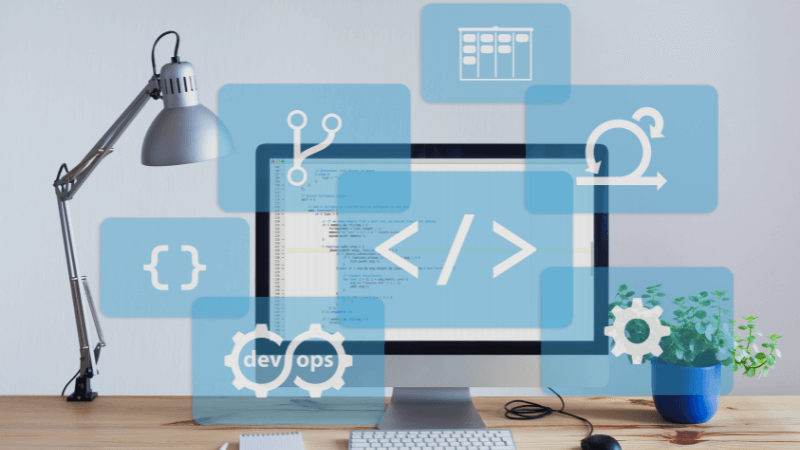In This blog
Today, more and more companies are recognizing the key role of automation in their software development process, and test automation in particular. Many companies adopt continuous integration and continuous delivery in order to release new features faster. This requires using a dedicated CI/CD tool that will automate the process of integration, testing, and deployment of new code changes.
There are many CI/CD tools available in the market and multiple factors to consider when choosing one such as costs, integration with other tools, and support. Let’s explore CI/CD, its benefits, and compare the top 8 CI/CD tools.

What is CI/CD?
The term CI/CD refers to two practices: continuous integration and continuous delivery. These practices are used mainly in a DevOps approach in order to automate the entire process of software development, testing, and deployment. Automating this process improves team speed and accuracy, as well as overall software quality.
CI/CD begins with Continuous Integration, which is the process of merging new code changes from multiple developers into a shared repository. Since the process is automated, developers can integrate their code changes without waiting for other developers to finish their work.
After the integration of code changes, the next step is Continuous Delivery. This involves automatically building, testing, and deploying the code changes to a staging environment. This environment simulates an actual production environment, enabling developers to test their code changes in a real-world scenario before live deployment. The Continuous Deployment process then takes over, which automatically deploys code changes to the live environment.
Why use CI/CD Tools?
The main advantage of CI/CD tools is automation, which significantly decreases the time and effort required to release software while increasing accuracy and reliability. Here are some of the other benefits companies can gain from using CI/CD tools:
- Automation saves time and effort in releasing higher quality software.
- Faster product delivery without additional intervention from human employees.
- Shorter development cycles and streamlined workflows.
- Enablement of automatic tests such as unit tests and integration tests to identify bugs and issues before deployment.
- Identification of errors earlier in the development process to prevent problems for users and save company resources.
- Improvement of a company’s agility and responsiveness in the market provides a competitive advantage.
Popular CI/CD Tools
 Jenkins is an open-source CI/CD tool for automating the software development lifecycle. Originally created in 2004 by Kohsuke Kawaguchi, Jenkins has become one of the most popular CI/CD tools around the world. It can be used to build, test, and deploy your code automatically when changes are pushed to a repository such as GitHub. With over 1,000 plugins available, Jenkins is a highly versatile tool for implementing continuous integration and delivery pipelines.
Jenkins is an open-source CI/CD tool for automating the software development lifecycle. Originally created in 2004 by Kohsuke Kawaguchi, Jenkins has become one of the most popular CI/CD tools around the world. It can be used to build, test, and deploy your code automatically when changes are pushed to a repository such as GitHub. With over 1,000 plugins available, Jenkins is a highly versatile tool for implementing continuous integration and delivery pipelines.
 CircleCI is a widely used continuous integration tool that allows developers to build, test, and deploy applications. With over 1 million engineers using it, CircleCI is one of the most favored tools on the market. It supports multiple programming languages, including Python, Ruby, JavaScript, Java, Clojure, PostgreSQL, and MySQL. CircleCI offers a wide range of features that make it easy for developers to release code faster while maintaining high-quality standards. Circle CI also integrates with many different tools, allowing users to better streamline their automation efforts.
CircleCI is a widely used continuous integration tool that allows developers to build, test, and deploy applications. With over 1 million engineers using it, CircleCI is one of the most favored tools on the market. It supports multiple programming languages, including Python, Ruby, JavaScript, Java, Clojure, PostgreSQL, and MySQL. CircleCI offers a wide range of features that make it easy for developers to release code faster while maintaining high-quality standards. Circle CI also integrates with many different tools, allowing users to better streamline their automation efforts.
 Bamboo Data Center is a continuous delivery pipeline from Atlassian. It is a powerful tool that offers many features to automate the software development process, making it an excellent choice for organizations of all sizes. As part of the Atlassian family, Bamboo perfectly integrates with other Atlassian tools like Jira Software, making it easy to track progress and providing full transparency of the entire process.
Bamboo Data Center is a continuous delivery pipeline from Atlassian. It is a powerful tool that offers many features to automate the software development process, making it an excellent choice for organizations of all sizes. As part of the Atlassian family, Bamboo perfectly integrates with other Atlassian tools like Jira Software, making it easy to track progress and providing full transparency of the entire process.
 Travis CI is a cloud-based CI/CD tool that is used to build and test software projects hosted on GitHub, Assembla, Bitbucker, and more. With a quick and simple setup, Travis CI allows users to start testing projects within minutes. The tool supports over 30 different coding languages and is compatible with Mac, iOS, and Linux.
Travis CI is a cloud-based CI/CD tool that is used to build and test software projects hosted on GitHub, Assembla, Bitbucker, and more. With a quick and simple setup, Travis CI allows users to start testing projects within minutes. The tool supports over 30 different coding languages and is compatible with Mac, iOS, and Linux.
 GitLab is a complete DevOps platform that supports the entire software development lifecycle from idea to production. Among the large variety of uses this platform offers, it is also widely used for continuous integration and delivery in build, testing, deploying, and monitoring applications. GitLab CI/CD helps users verify that the code deployed to production adheres to the code standards they set.
GitLab is a complete DevOps platform that supports the entire software development lifecycle from idea to production. Among the large variety of uses this platform offers, it is also widely used for continuous integration and delivery in build, testing, deploying, and monitoring applications. GitLab CI/CD helps users verify that the code deployed to production adheres to the code standards they set.
 Released in 2006 by JetBrains, TeamCity is a continuous integration server that enables users to optimize the build queue and run tests automatically. The platform has strong reporting capabilities providing disk usage, build time, and server health reports. With multiple ways to reuse settings and the option to run history builds, TeamCity can help significantly increase project efficiency.
Released in 2006 by JetBrains, TeamCity is a continuous integration server that enables users to optimize the build queue and run tests automatically. The platform has strong reporting capabilities providing disk usage, build time, and server health reports. With multiple ways to reuse settings and the option to run history builds, TeamCity can help significantly increase project efficiency.
 GoCD is a free, open-source continuous delivery tool that automates the entire build, test, and deployment process. GoCD provides a range of features that make it easy for developers to build and test their code, including support for parallel execution and integrations with popular version control systems like Git, Mercurial, and SVN. This tool is well-known for its strong visibility capabilities thanks to the Value Stream Map feature that allows developers to view the entire workflow.
GoCD is a free, open-source continuous delivery tool that automates the entire build, test, and deployment process. GoCD provides a range of features that make it easy for developers to build and test their code, including support for parallel execution and integrations with popular version control systems like Git, Mercurial, and SVN. This tool is well-known for its strong visibility capabilities thanks to the Value Stream Map feature that allows developers to view the entire workflow.

What to Look for in the Right CI/CD Tool
When selecting a CI/CD tool, it is important to take into consideration all angles of your business needs. Since there are many options in the market with different features and costs, you should focus on your company’s specific requirements. Think about your project type, available resources, integration with existing tools, and so forth. These are the main elements your CI/CD solution should provide:
- Flawless functionality and automation capabilities
- Support for different programming languages and platforms
- Integration with different systems such as in-use tools and version control systems
- Easy to use with fast implementation
Get the Most Out of Your CI/CD Process
CI/CD is an important DevOps practice of automating application delivery, from building and testing to deployment. CI/CD tools are designed to help automate this process by providing an easy way for developers to integrate their code into automated builds and tests that run in parallel, and deliver software faster. The best CI/CD tool is the one that suits your needs the most, is easy to use, and fits your budget.























